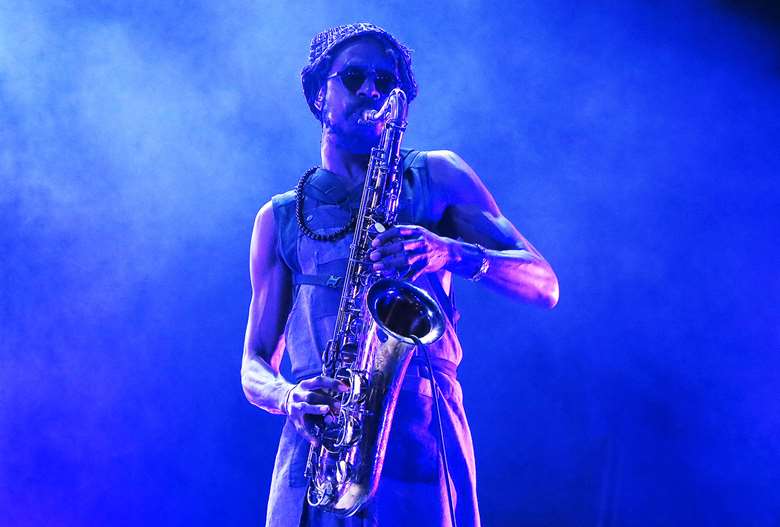The Comet is Coming, Theon Cross and Cinematic Orchestra energise WOMAD 2023, Charlton Park
Tony Benjamin
Wednesday, August 23, 2023
Fiery performances and a vibrant mix of genre-smashing sounds beat the damp conditions and bring musical sunshine to this year’s all-encompassing festival

The global reach of the annual World of Music and Dance festival (aka WOMAD) means that you can reliably expect an eclectic cavalcade of ethnic traditions, contemporary popular musics and transcultural fusions. The strong presence of improvisatory musics means that jazz sits well with the festival and, indeed, this year’s UK contribution was dominated by contemporary jazz acts including The Riot Jazz Brass Band, Theon Cross and The Comet is Coming.
The latter two drew really big and enthusiastic late-night crowds despite the intermittent rainfall that dogged the weekend. The Comet is Coming had announced this summer to be their last as a band and this added a piquancy to a set which intensified into a visceral cascade of noise indulgence. An almost prog-rock ‘cosmic’ synth and drum sound ratcheted up, with Shabaka Hutchings circular breathing and distinctively raw tenor sax hurtling around the 360-degree D&B Soundscape system. Definitely a case of ‘quit while you’re winning’. As ever, Theon Cross deployed his rack of effects to great purpose, transforming his tuba’s voice into orchestral sweeps or dropping into awesome sub-bass grinds. His rapport with the excellent Chelsea Carmichael continues to flower, giving her tenor sax equal prominence in the music which consciously shifted between styles from grimy dance beats to Memphis soul grooves and a dub reggae nod to Max Romeo’s Chase The Devil.

Chelsea Carmichael, Theon Cross and Nikos Ziarkas - Photo by Tony Benjamin
Afrobeat - Fela Kuti’s 70s fusion of US funk with West African Hi-Life - continues to thrive world-wide partly thanks to Femi Kuti’s adopting his late father’s mantle with his band The Positive Force. Their main stage set was a well-organised show very much focussed on Femi himself, singing in Afrobeat’s demotic style or adding saxophone and keyboard solo flourishes. It had a formal showmanship reminiscent of Fela’s hero James Brown, whereas Dele Sosimi (himself formerly of Fela’s Egypt 80 band) made more of the instrumental strengths of his UK-based Afrobeat Orchestra. A powerhouse horn section of Nick Walters’ trumpet, Justin Thurgur’s trombone, Tamar Osborn on baritone sax and Ben Plocki on bass sax all took their turn for riveting solo work as well as contributing punchy brass harmonics for Dele’s songs. The quirkiest Afrobeat on offer came from Ajate, who took the genre’s format into Japanese traditional instrumentation and applied the international language of exuberance. The result was quirkily original - if occasionally unrecognisable - and always very entertaining.
There is always the risk of musical tourism with a world music festival and some non-religious people were surprisingly put off by the spiritual sincerity of two forceful gospel bands – yet it was this very commitment that energised their performances. After over 60 years performing The Staples Jr. Singers used a fine blend of classic R&B styles in that Southern Baptist way, while Ghana’s Alogte Oho and his Sounds of Joy created a mash-up of reggae, soul and African drumming to support some fine harmony vocals. The same disgruntled atheists had less problem with the Sufi devotions of Qawwali singers as represented by the Amrat Hussain Brothers Trio, whipping up increasingly intricate tabla under the traditional soaring call-and-response vocals. The heartfelt ecstasy of the music was less well served by Orchestral Qawwali, a fusion project adding a string orchestra arrangement to the traditional party. Despite the superb vocals of Abi Sampa the free fluidity of Qawwali was inevitably dampened whenever the full strings became involved.

By contrast, the finest moments of the weekend came in the most basic of forms: the acoustic instrumental duo (pictured above) of Kayhan Kalhor’s Persian kamancheh violin and Erdal Ezincan’s Turkish baglama lute. Seated centre-stage the ECM-recorded pair tossed a simple folk tune between themselves, finding endless ways to improvise around it, challenging each other with dry humour while occasionally taking virtuoso flight. It was perfectly simple and simply perfect and for 45 riveting minutes I just couldn’t take my ears off them.